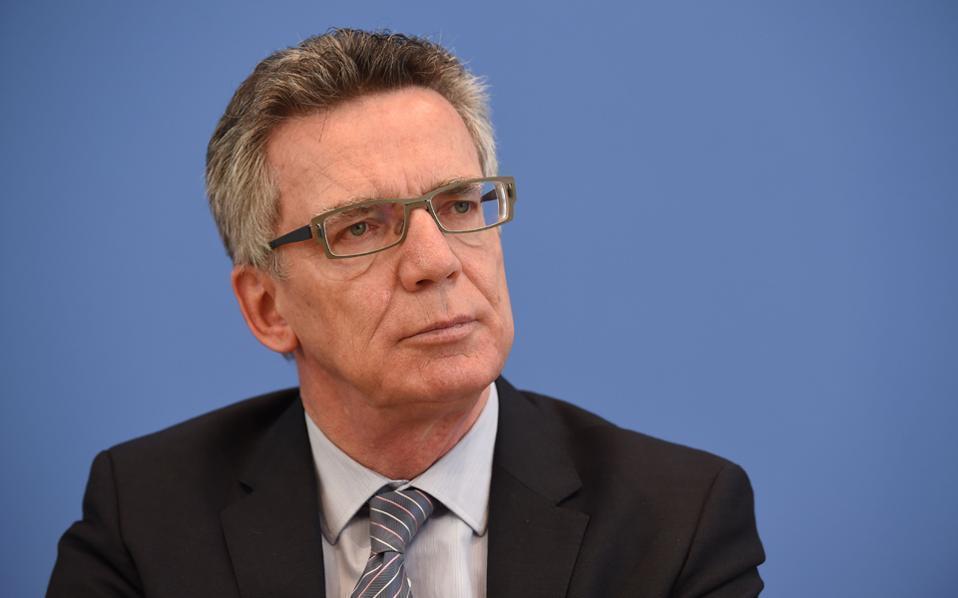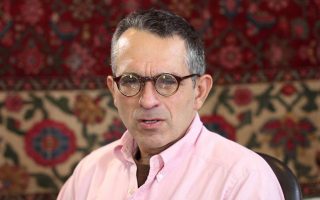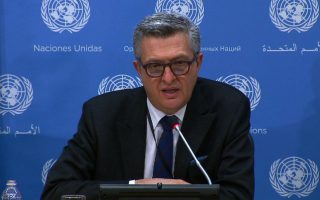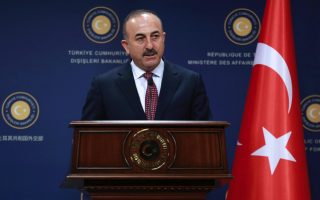Thomas de Maiziere wants to reinstate Dublin rules

A year after the mass arrivals of refugees in Germany, the country’s Interior Minister Thomas de Maiziere talks to Kathimerini about the need to implement the Dublin regulations, the European Union’s relocation program, and the agreement between the EU and Turkey to stem migration flows. The German official also lays out Berlin’s five-point strategy in dealing with the migration crisis, and stresses the need to strengthen security measures amid ongoing police searches for terrorist suspects on German territory.
A year after a record number of refugees arrived in the country, what is your assessment of the situation?
The situation has changed in the last months. The migration flows from Syria, Afghanistan and Africa toward Europe continue but the Balkan trail is now closed and the agreement between Europe and Turkey is working. This has defused the situation. As the war in Syria continues, our concerns remain high and we have to focus on long-term decisions, which hopefully will improve the situation in Syria.
Is the EU agreement with Turkey sustainable?
Yes, so far the agreement is working. There are far fewer migrants taking the route from Turkey to Europe. But it is very important to accelerate the asylum processes in Greece, to make the repatriation process run as well. In the coming months we will have a clearer picture. It is our goal to reach similar agreements, for example, with countries in North Africa, Pakistan or Afghanistan.
Where are we in the relocation process and what will you do if countries such as, for example, Hungary [a referendum over the weekend on rejecting EU migrant quotas was rendered invalid by the low turnout] refuse to receive any refugees?
The refugee resettlement program is an obligation agreed on by the members of the European Union. However, the figures of relocated refugees are low at the moment. Let me explain the situation in Germany to [your] readers: Last year in particular Germany focused on other priorities because of the extremely high numbers of refugees entering Germany. However, Germany has recently accelerated the relocation of refugees. On September 7, for example, 150 refugees were relocated from Greece to Germany. I have already assured my Greek and Italian colleagues that Germany is ready to accommodate up to 500 people from both countries per month respectively, if the necessary information about the people is provided beforehand.
Do you support the restoration of the Dublin Treaty and the refugees’ return back to Greece?
I know that these comments have caused great reactions in Greece. However, it should be remembered that this is the current legal situation. The Dublin Convention says that asylum procedures must be carried out in the country in which asylum seekers first entered Europe. When refugees leave that country, they may be returned. In 2011, the European Court of Human Rights ruled that, due to the low standards for asylum seekers in Greece, asylum seekers could not be sent back to Greece according to the Dublin rules. The EU has since then provided financial and other support for Greek efforts, given a lot of money to improve these conditions. That is why I would like to see the Dublin Convention implemented again. It would place Greece in line with all other European countries. [Migration Minister Yiannis] Mouzalas and I discussed that issue. We will come back to this topic at the meeting of interior ministers in October.
Mouzalas argued that this statement was made for political reasons. Do you agree?
Isn’t it precisely the job of politicians to take steps for political reasons? But what he probably meant was that the statement was made for home consumption. Of course the current situation is being increasingly criticized by the German public. We recognize the burden shouldered by Greece in recent years, but we still need a strategy to restore the legal situation.
Could you explain your strategy on the refugees crisis?
The strategy is not difficult. It is the implementation that is difficult. Our strategy is based on five pillars. First, we should address the causes of migration in their countries of origin, in order to prevent people from leaving their home. Second, the decision on who comes to Europe should not be taken by traffickers, as is the case today, but by European governments. Traffickers, who are basically criminals, take inhuman and unjust decisions. To prevent this, you need to establish and implement a strategy, like the agreement with Turkey. This will save lives and people will be in safe areas outside Europe. At the same time we need a resettlement program for persons entitled to protection. Third, we need to develop a common European asylum system, as a concerted approach to prevent secondary migration. Fourth, is that the refugees not entitled to protection need to be returned by all EU countries. I know this is a point emphasized by the Greek government. We must use all the policy instruments at our disposal to make this point vis-a-vis third countries that refuse to take back their citizens. Finally we need to focus on the integration of all those entitled to protection into our societies. This will benefit our societies, it will avoid social tension and ensure social unity.
Do you face any kind of problem with internal management?
In Germany, one aim has been the fast processing of a large number of asylum requests. We speeded up the process substantially in the last year. We must also be more effective in returning people who do not need our protection back to their own countries. This includes voluntary repatriation. Another important feature of our policy is the integration including in terms of language, culture and the labor market.
Are you worried about possible terrorist attacks? What sort of signals are you receiving?
We focus on security issues because we face a high threat level. Much has been done in the past, and I have just introduced a new proposal on how to further improve our security.
Is there a connection between terrorist threats and refugees?
We know that the migration flow has included people with links to terrorism. However, it would be wrong to say that there is a general connection between refugees and terrorists. But it would also be a fault to be naive, of course. The security agencies are alert. Currently some 60 investigations are under way against people because of possible relations with IS [the so-called Islamic State]. We are constantly improving our measures to prevent any terrorist attacks.
What has the impact of the refugee crisis been on German politics?
Recent elections in German federal states indicate the rise of far-right parties. It is a phenomenon that has existed in most European countries for some time. Thus we could say that this phenomenon has come to Germany with a certain delay. The refugee crisis and globalization helped the rise of these parties. However, we are working to stop this development. We must explain what we’re doing and we must find solutions for the problems that concern our citizens.





